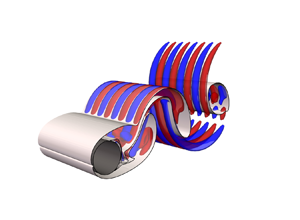Article contents
Compressibility effects on the secondary instabilities of the circular cylinder wake
Published online by Cambridge University Press: 05 July 2023
Abstract

With a growing interest in low Reynolds number compressible flows, compressibility effects on the secondary instabilities developing on the circular cylinder periodic wake are investigated. The unsteady and time-averaged two-dimensional flows are characterised for Reynolds numbers  ${{Re}} \in [200;350]$ and Mach numbers up to
${{Re}} \in [200;350]$ and Mach numbers up to  ${{M}}_{\infty }=0.5$, revealing different flow structures which influence the characteristics of the secondary unstable modes. The two-dimensional time-periodic solution is used as the base state for a global linear stability analysis performed by means of Floquet theory coupled with a time-stepping finite-difference approach of the nonlinear operator. The influence of compressibility on mode A and mode B secondary instabilities which are responsible for the three-dimensionalisation of the two-dimensional periodic wake is analysed. A stabilising or a destabilising effect of compressibility is observed on mode A, depending on the Reynolds number and the spanwise wavelength of the mode, while mode B is stabilised by the increase of the Mach number. Compressibility is indeed found to decrease the mode kinetic energy production due to base flow shear conversion, which drives the growth of mode B. This results in a delay of the three-dimensionalisation process of the wake due to compressibility.
${{M}}_{\infty }=0.5$, revealing different flow structures which influence the characteristics of the secondary unstable modes. The two-dimensional time-periodic solution is used as the base state for a global linear stability analysis performed by means of Floquet theory coupled with a time-stepping finite-difference approach of the nonlinear operator. The influence of compressibility on mode A and mode B secondary instabilities which are responsible for the three-dimensionalisation of the two-dimensional periodic wake is analysed. A stabilising or a destabilising effect of compressibility is observed on mode A, depending on the Reynolds number and the spanwise wavelength of the mode, while mode B is stabilised by the increase of the Mach number. Compressibility is indeed found to decrease the mode kinetic energy production due to base flow shear conversion, which drives the growth of mode B. This results in a delay of the three-dimensionalisation process of the wake due to compressibility.
Information
- Type
- JFM Papers
- Information
- Copyright
- © The Author(s), 2023. Published by Cambridge University Press
References
- 9
- Cited by


